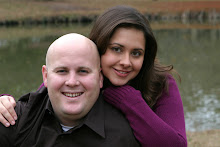Experiential Theology
I have had some thoughts rolling around in my brain for quite some time and it is time for me to jot them down. Growing up in the church I can't tell you how many times I have heard people tell me not to trust my feelings. "They'll lead you astray," some have told me. We read passages that say, the heart is deceitful above all things (Jeremiah 7:9). Campus Crusade taught me to rely on the fact, faith, feeling train. Notice feelings come last because we can't trust them.
I have observed over years in ministry that people are significantly lead by emotions, the just won't admit it. Often facts are used to support what one feels in the heart. Our Christian leaders scorn people for being emotion and experience driven. For them, emotion is the root of the corruption in the Christian faith. They cite examples in the charismatic and "liberal" churches.
I wish God would listen to these leaders. Surely He had something else in mind when Jesus claimed that the greatest commandment was loving God with all your heart, mind, soul, and spirit. God is an experiential teacher. Much of the Old Testament documents God taking His people through experience after experience in order to teach them about Himself. The wanderings in the desert, the feasts, circumcision...etc. These are all meant to point the people to the Lord.
People today are experience driven. They define who they are and their thoughts on God through interaction with the world and others. Why don't we use this for our advantage?
What I am proposing is that our teaching of faith include experiences that reinforce positive theology. Instead of ignoring emotion and experience we embrace them as a valid means of transmitting the truth of Christ. I am not promoting false experiences or manipulation of the heart. I believe God models a form of spiritual formation that includes Truth and Experience.
What does that look like? I am still trying to figure that out. I do know that Christian Spiritual formation includes the practice of spirituality within the teaching context. Most churches are set up like this. Come learn the truth you need to know. We'll give you some practical tips to apply this in your life and next week we will move on to the next truth. There should be some time devoted to the actual practice of the application of scripture inside the church. If we talk about prayer, then give people a chance to pray.
My hope is that experiential theology will help form Christians who live and love with an anchor of truth, community, and applied experience.


0 Comments:
Post a Comment
Subscribe to Post Comments [Atom]
<< Home